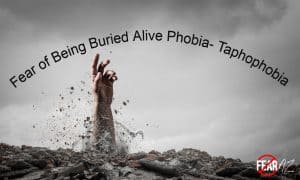Share This Article
The Fear of Being Buried Alive Is a Common Phobia
Do you wake up screaming after nightmares about being buried alive? Does the thought of seeing someone else being buried alive give you sleepless nights?
If your answer to these questions is yes, then you are most likely suffering from taphophobia, the fear of being buried alive.
While watching movies, do scenes involving funerals make you sweat? Do you worry about instances of people being buried alive? Perhaps you start to feel breathless, dizzy, or have headaches that can last for days. Experiencing these problems might have you wondering, Why am I scared of being buried alive? or How do you get rid of the fear of being buried alive?

What Is Taphophobia?
The word “taphophobia” was derived from the Greek term taphos meaning “tombs or graves” and phobos meaning “deep dread or fear.” Taphophobia or taphephobia is described as the extreme fear of being buried alive.
While knowing this might not make you feel better, consider this: Several well-known personalities, such as Edgar Allan Poe, Hans Christian Andersen, George Washington, and Frederic Chopin, a Polish composer, were known to suffer from taphophobia.
Taphophobia is closely related to other phobias such as thanatophobia (fear of death) or placophobia (fear of tombstones). Experts have also noted that taphophobics may also be afraid of cemeteries (coimetrophobia) as well as enclosed or tight spaces (claustrophobia).
Although it is not unusual to be scared of being buried alive, a taphophobic is so fearful they avoid certain places and situations.
Individuals who have taphophobia may request elaborate arrangements for their funeral, such as putting heart stimulators, air tubes, and oxygen tanks in their caskets. Some may even ask that they not be buried for at least three days after their death.
Why Do People Have Taphophobia?
As with many other types of phobias, there is no single cause for taphophobia. However, the most common reasons why some may have taphophobia are listed below:
- Having been trapped in a tight, enclosed space at some point in the past
- Looking at or reading about people being buried alive
- Substance abuse
- Mental disorders such as depression and anxiety
- Genetics and a family history of taphophobia
People with taphophobia may avoid closed buildings fearing they may collapse. Taphophobics might choose not to undergo medical surgeries that include anesthesia because they worry they may be mistaken for dead and be buried alive. They may even refuse to view tombstones or visit graveyards and may become hysterical when witnessing a funeral.
What Are the Symptoms of Taphophobia?
Let us take a look at taphophobia symptoms, the mental, emotional, and physical.
Mental/Emotional Symptoms
- Difficulties in concentrating
- Panic attacks
- Inability to relax
- Losing temper easily
- Irritability
- An impending sense of dread
Physical Symptoms
- Dizziness
- Prickly sensation all over the body
- Palpitations
- Body aches
- Dryness in mouth
- Excessive sweating
- Breathlessness
- Frequent headaches
- Poor sleeping patterns
- Irregular heartbeat
Since the symptoms of taphophobia are generally overwhelming and uncontrollable, they can take over an individual’s thought process completely. This may cause them to take extreme measures to avoid dealing with their fear. Though taphophobics lead normal lives, the anxiety can interfere with their day-to-day activities in severe cases. If you think you may have taphophobia, it’s important to seek help.
If you’re wondering how to get rid of the fear of being buried alive, read on for tips on self-help and professional methods.
What Can I Do to Help Myself for Taphophobia?
Taphophobia is a fear that, in many cases, can be overcome. But first, you need to acknowledge your fear. Acceptance is the first step towards recovery.
If you’d like to try to tackle taphophobia on your own, here is a list of lifestyle changes you can make:
- Engage in physical activity, especially something calming, such as yoga or Tai Chi
- Practice meditation including deep breathing and mindfulness techniques that can help to relax the mind and eliminate thoughts related to death
- Take part in charities and voluntary work
- Try to expose yourself to cemeteries and graves, either by visiting them or looking at photos, videos, and movies
Professional Help
If you feel you simply cannot overcome taphophobia on your own, seek professional help. A therapist can help you with your fear using various therapies such as neuro-linguistic programming, cognitive behavioral therapy (CBT), and hypnotherapy. Let us take a look at each of these methods in detail.
Neuro-Linguistic Programming (NLP)
Under NLP, your mind is re-oriented to view your phobia more positively. Since taphophobia is the fear of being buried alive, you may detest visiting cemeteries and graveyards because you view these places with dread. With NLP, however, you may begin to see burial grounds as positive and acceptable rather than as something that terrifies you.
Cognitive Behavioral Therapy (CBT)
In CBT, your therapist will help you replace negative thoughts with positive ones.
As part of the process, therapists will help you identify the root cause of your negative thoughts and develop coping mechanisms to overcome them. You might be asked to weigh the pros and cons of each solution and then choose the solution that you can implement. You might also be asked to keep track of your behavior and understand the things and situations that trigger your negative thoughts.
Hypnotherapy
As the name suggests, hypnotherapy uses hypnosis to treat the phobia. Individuals are induced into a hypnotic state which helps them detach from their external surroundings and focus on their inner selves. The therapist may then ask you to picture yourself in a state of complete relaxation, then suggest behavioral changes and coping techniques to help you overcome your fear.
Others with Excessive Fear of Being Buried Alive
How to Avoid Taphophobia Altogether?
If you wish to avoid taphophobia altogether, then you shouldn’t visit cemeteries, graveyards, or tombstones at all. You might also avoid reading about or looking at photos, videos, movies, and TV shows centered around death or burials. Skip over the scenes that include death and funerals.
In addition, try and limit your interactions with those who are near death or those who are preparing for a funeral.
This may sound doable, but remember: death is an inevitable part of life. Eventually, you’ll have to attend a funeral or comfort a friend or loved one. Therefore, learning how to control your anxiety is more practical than avoidance.
Conclusion
A taphophobic person often feels left out and isolated because they believe their fear will be misunderstood and that others will mock them. However, like several other phobias, taphophobia is entirely curable and can be overcome with the correct treatment. It’s important to accept your fears and get help, to begin living a normal, healthy life.
SOURCES:
http://www.wolverhamptonhypnotherapy.co.uk/phobias/taphophobia.html
https://www.tranceformpsychology.com/mental-health-problems/phobias/taphophobia.html
https://www.allaboutcounseling.com/library/taphophobia/
https://www.verywellmind.com/what-is-cognitive-behavior-therapy-2795747







